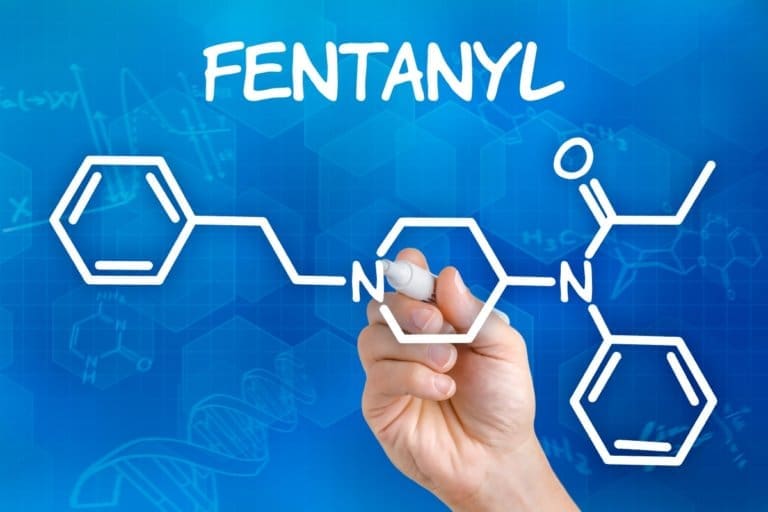Fentanyl Overdose Symptoms
- February 22, 2023
- Prosperity Haven
- Addiction Treatment

Note: If you suspect an overdose, call 911 immediately.
Fentanyl is one of the most dangerous narcotics on the planet. Its use over the past two decades has tragically caused record overdose deaths, and this trend does not look like it will stop.
Knowing the signs of fentanyl overdose saves lives. Keep reading to find out all the information you need to save the life of a loved one by getting them help before they overdose on fentanyl.
How Much Fentanyl Does It Take To Overdose?
Fentanyl is an incredibly powerful opioid drug that is commonly used to treat severe chronic and acute pain. However, due to its highly potent and addictive nature, it is extremely dangerous. It’s important to understand how much fentanyl it takes to overdose, and why it’s so dangerous.
The amount of fentanyl required to cause an overdose varies from person to person depending on several factors such as body weight, tolerance, and other medications the user may have taken. Generally speaking, it only takes a very small dose of fentanyl in order for it to be potentially lethal – as little as 2mg can be enough to cause an overdose. This is equivalent to 1/12500 of a teaspoon, or a couple of grains of sugar.
The risks associated with fentanyl abuse are amplified due to its potency and the fact that it is often used in combination with other drugs, such as meth or cocaine. This drastically increases the risk of an accidental overdose.
How Long Does It Take To Overdose On Fentanyl?
The amount of time that it takes for an individual to overdose on fentanyl varies depending on a number of factors, including their own physiology, dosage size, and route of administration.
In general, when fentanyl is injected, people overdose on fentanyl within a few minutes or even seconds. When taken through the nasal passages (snorting) or lungs (smoking), it can take up to 15 minutes for an overdose to occur.
Note that any amount of fentanyl can be deadly and no one should ever use this drug recreationally or without a doctor’s prescription. If you or someone else appears to be suffering from an overdose, seek medical attention immediately as overdoses can be fatal.
Can You Overdose From Touching Fentanyl?
The answer to the question “Can you overdose from touching fentanyl?” is that it is unlikely. Fentanyl is a powerful synthetic opioid that is typically used in medical settings as an analgesic, and it has been linked to overdoses when taken intravenously, inhaled, or ingested. However, it is not likely for a person to overdose by simply touching fentanyl.
Inhaling or ingesting small amounts of fentanyl can still be dangerous, however, because the drug is so potent. If you come into contact with any substance that you believe may contain fentanyl, it’s important to take safety measures and avoid breathing in any vapors or putting your hands near your face.
Fentanyl Overdose Dollar Bill Myth
There have been rumors that it is possible for someone to overdose merely from touching a dollar bill that had come into contact with fentanyl. This is completely false. You cannot overdose from touching a banknote that has been in contact with fentanyl.
Fentanyl is an extremely potent opioid drug and even inhaling or ingesting tiny amounts can be deadly. However, just touching a banknote that was in contact with fentanyl would not present enough of a risk to cause an overdose. The amount of fentanyl that could potentially become airborne from touching a banknote would be too small to cause an overdose.
Nonetheless, it is important to note that if fentanyl was present on a surface, it should be handled with extreme care and washed off as soon as possible. It is also highly recommended that anyone who comes into contact with fentanyl wear protective gear such as gloves and face masks.
Fentanyl Overdose: What Happens to the Body
Keep reading to find out what happens to the body during a fentanyl overdose. Note that all of these may happen with other substances as well.
Respiratory Depression
One of the most serious, and potentially fatal, results of a fentanyl overdose is respiratory depression. This occurs when breathing becomes significantly slowed or stopped altogether. When this happens, oxygen levels drop in the bloodstream and cells become deprived of the oxygen they need to survive.
Cardiac Arrest
A fentanyl overdose can also cause cardiac arrest, which is when the heart suddenly stops beating and blood no longer circulates throughout the body. This can be caused by a drop in oxygen levels due to respiratory depression, as well as an excess of opioids in the bloodstream that causes electrical disturbances in the heart.
Unconsciousness
When the body is overwhelmed by powerful opioids, such as fentanyl, unconsciousness can occur. This can be caused both by respiratory depression and cardiac arrest. Unconsciousness can also be induced even if they are not experiencing a full-blown overdose.
Seizures
Overdoses of opioid drugs, including fentanyl, can also cause seizures. This is caused by a sudden surge in the neurotransmitter known as glutamate and can result in intense muscle contractions, loss of consciousness and other dangerous symptoms.
Coma
In some cases, people who overdose on powerful opioids such as fentanyl may enter a coma-like state. This can be caused by a combination of respiratory depression, cardiac arrest and seizure activity. It is a very serious medical condition that must be monitored closely by medical professionals.
Death
If not treated quickly and appropriately, fentanyl overdoses can be fatal. Death occurs when oxygen levels become too low for the body to sustain life, or when vital organs fail due to cardiac arrest or other complications. It is important to seek medical attention immediately if you think someone may have overdosed on fentanyl.
Fentanyl is a powerful and highly addictive synthetic opioid that is often used in palliative care settings to manage pain. However, due to the drug’s strong potency and addictiveness, it comes with a number of risks. In particular, fentanyl can be extremely dangerous when abused or misused, as overdose can occur rapidly and without warning.
Keep in mind that fentanyl abuse and misuse has devastating effects on mental, physical, and emotional health. If you are concerned about your own or someone else’s use of fentanyl, get help from a medical professional as soon as possible.
Prevent Fentanyl Overdose By Breaking The Cycle of Addiction
The most effective way of starting recovery from fentanyl addiction is to get help from a professional. The first step in getting professional help is to find a qualified addiction treatment provider or program that specializes in treating opioid use disorders. Treatment programs vary widely, but most provide medication-assisted treatment (MAT) along with counseling and other support services.
When looking for a drug rehab, choose one that is experienced in treating opioid addiction and has a proven track record of successful recovery outcomes. You should make sure the provider offers follow-up care after treatment, as this is an essential part of long-term recovery from fentanyl addiction.
For more information on how you or a loved one can break free of fentanyl addiction, contact us today.
YOUR NEW BEGINNING
STARTS HERE
Take the First Step and Reach Out Today






